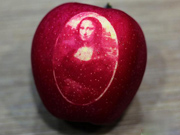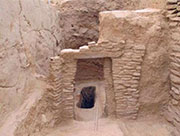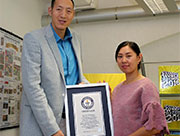

LOS ANGELES, Oct. 3 -- An exhibition, themed on the life of China's late space scientist Qian Xuesen, who is considered "Father of Chinese Rocketry," was staged in California Institute of Technology (Caltech) on Friday.
Qian, who died in 2009 at the age of 98, was born in China and has studied at the Massachusetts Institute of Technology and Caltech in the United States.
Marking the 60th anniversary of Qian's returning to his homeland from the U.S. in 1955, the exhibition titled "Qian Xuesen: a man of science and an inspiration to scholars," features numerous archives, documents and images of the scientist throughout his life and career.
"It is rare that one individual that can make such great achievements in two countries in one's life time," Dr. Thomas F. Rosenbaum, president of Caltech, one of the sponsors, said when opening the exhibition.
"If you look at Professor Qian, at what he used to do both in the U.S. and in China, (you) reflect the way that language of science can improve the future for humanity, not a particular country," he said.
Before returning to China, Qian spent two decades studying and working in the United States, and made seminal contributions in applied mechanics, aeronautical engineering and many other fields.
Qian was a founding member of the rocket research group in Caltech, not only involved in the formation of the Jet Propulsion Laboratory (JPL), but also making contributions to the victory of allied countries in the world anti-fascist war.
"The influence of Qian Xuesen was profound, who led the formation of JPL, and of course China's space program and missile program depended crucially on the contributions of the same man," Rosenbaum said.
Qian played a key role in China's missile and aviation programs after he returned to his motherland in 1955.
"60 years ago, Qian Xuesen and his family left Caltech to China. Six decades represent a cycle of life in China's traditional philosophy," Zhang Kai, vice director of Qian Xuesen Library and Museum with Shanghai Jiao Tong University, an organizer of the exhibition. "Therefore we are really thrilled that this year in 2015, we can take his exhibit to the institute where he felt deeply attached to."
The exhibition intends to portray Qian's life and legacy, convey his enthusiasm for science and education, and illustrate a few defining moments of his legendary life, the organizer said.
Qian Yongzhen, Qian Xuesen's daughter told Xinhua that the most important meaning of the exhibition is to "inspire the young generation."
"Science is an international language. It is a special way to connect," Rosenbaum told Xinhua. "I am very excited about the possibility it connects."
 |  |
Day|Week

 "Luxury" art apples debut in Shanghai
"Luxury" art apples debut in Shanghai Photos and hand-painted pictures brighten the military training life
Photos and hand-painted pictures brighten the military training life Models steal the light at Nanjing auto expo
Models steal the light at Nanjing auto expo Magnificent Xian H-6 strategic bomber
Magnificent Xian H-6 strategic bomber Bikini models compete in oriental beauty pageant
Bikini models compete in oriental beauty pageant Archaeologists find 4,000-year-old sentry post in Shaanxi
Archaeologists find 4,000-year-old sentry post in Shaanxi Stunning photos of air show in China’s V-Day parade
Stunning photos of air show in China’s V-Day parade Chinese couple claim title for Guinness world's tallest married couple
Chinese couple claim title for Guinness world's tallest married couple Left-behind child faces separation from father after summer vacation
Left-behind child faces separation from father after summer vacation Scenic Liangshan: Photographers' paradise
Scenic Liangshan: Photographers' paradise